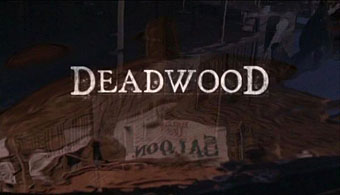So farewell then, Al and company. Deadwood finished its third and final season this week. Since it’s still running in the UK I won’t say anything about how things turn out. There was supposed to be a fourth season but it seems we’ve been denied this after HBO cancelled the run. This is a shame but we should probably be thankful that the thing exists at all at a time when television drama in the UK has been run into the swamps of mediocrity.
I came across Deadwood by chance via a mention in The Guardian that described Ian McShane swearing and murdering his way through a new role as malevolent saloon owner, Al Swearengen. If it hadn’t have been for the whole pirate TV network that now exists it’s unlikely I would have seen it at all. My television gave up the ghost a few years ago and even when it was working I didn’t have any satellite channels which is where it’s been shown in Britain. I downloaded the first episode and was immediately knocked out by the incredible period atmosphere (no mere sets these, they built an entire town), the cinema-quality production values and the exceptional performances. Ian McShane had played villains in the past but Al Swearengen was as far away from cheeky antiques dealer Lovejoy as it was possible to get. The rest of the cast was just as good but for me it was the scripts that made the series. The Sopranos may have the edge in being closer to our world and our lives but the language of Deadwood, its prolixity and elaboration amongst the most outrageous cursing, was completely without precedent. I’m looking forward to re-watching the entire run on DVD so I can go back over some of the incredible aphorisms that the writers gave to these characters, lines at once baroque but with an elegance fitting a BBC period drama and completely lacking the anachronisms (swearing aside) that often spoil Hollywood films. No wonder that Brian Cox demanded to be given a part; he was also given some of the best lines in the third season as actor/manager Jack Langrishe.
As with many cultural works, it seems to be the very things I enjoy that serve to alienate a drama like this from a wider audience. The Sopranos is pretty much a soap opera with the addition of strippers and people being whacked; nothing too challenging there. Deadwood was darker and quite often a lot weirder. Tony Soprano confides his troubles (albeit reluctantly) to a psychiatrist; Al Swearengen talks to the severed head of an Indian chief he keeps in a box. In The Sopranos considerable care has to be taken when disposing of bodies; in Deadwood they’re dragged round the corner to the Chinese quarter and fed to the pigs. This sounds inordinately grim but there was also a great deal of humour (often of a rather black variety), a major tragedy in season 2 and a very poignantly-developed lesbian relationship. The fact that this series came about at all provides a sliver of hope that television drama isn’t quite the redundant medium it often seems to be. It’s this, not 24 or Lost, that people will still be watching in years to come. It seems there may yet be two more feature-length specials that continue events. Fingers crossed for those. The first two seasons are out there now on DVD. Run, don’t walk.





